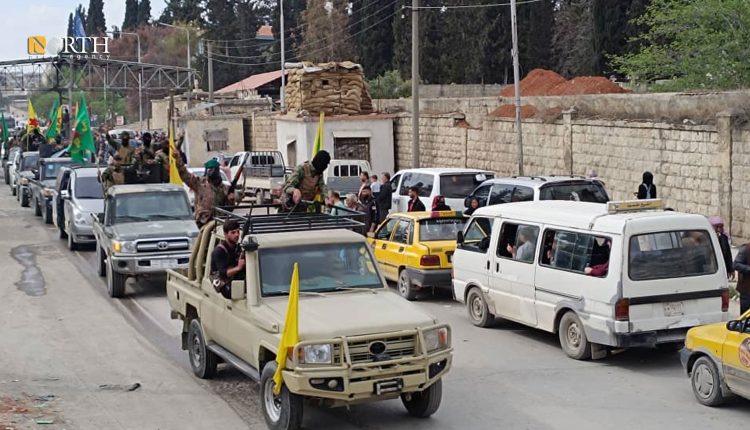Kurdish Forces Withdraw from Aleppo Neighborhoods Under New Syrian Deal
By Kardo Roj
ALEPPO, Syria (North Press) –
Kurdish-led military units began withdrawing from two majority-Kurdish neighborhoods in Aleppo on Friday, as part of a recently brokered agreement between the Kurdish local councils and the Syrian government. The development follows a major detainee exchange between the two sides, marking the start of an evolving security and administrative cooperation.
A North Press correspondent in Aleppo confirmed that military convoys from the People’s Protection Units (YPG) and the Women’s Protection Units (YPJ) exited Sheikh Maqsoud and Ashrafieh neighborhoods in the morning, accompanied by Syrian internal security forces.
The agreement, signed earlier this week, includes provisions for mutual prisoner release, administrative cooperation, and the safeguarding of local governance autonomy in Kurdish-majority areas of the city.
The accord, announced publicly by Badran Ciya Kurd—a senior official in the Autonomous Administration of North and East Syria (AANES)—outlines joint coordination mechanisms in security, services, education, and cultural preservation. The arrangement seeks to formalize cooperation between the Kurdish-run neighborhood councils and Aleppo’s municipal authorities without undermining the existing governance model in place since the Syrian government’s partial return to the city in 2016.
As part of the first phase of implementation, the sides conducted a large-scale exchange on Thursday, involving more than 200 detainees. According to local sources, most of those released were low-level fighters, activists, or civilians detained during past clashes or political disagreements.
“The agreement ensures the full preservation of the neighborhoods’ unique character—administratively, culturally, and politically,” Ciya Kurd wrote on X (formerly Twitter), noting the plan was coordinated with both local institutions and the Syrian Interior Ministry.
Under the terms of the deal, the Kurdish Internal Security Forces (Asayish) will retain their presence in the neighborhoods, maintaining checkpoints and conducting joint patrols with Syrian police under the Ministry of Interior’s oversight. The agreement specifically prevents interference from external armed factions, signaling a continued rejection of the influence of Turkish-backed Syrian National Army (SNA) groups, which are active in other parts of northern Syria.
Education, long a sensitive issue in Kurdish-held areas, will remain under local administration until broader consensus is reached across northeast Syria. Additionally, Kurdish neighborhoods will gain full representation in Aleppo’s Provincial Council and other state institutions, including the Chamber of Commerce.
This move comes amid a broader realignment of political and military strategies in Syria. In late 2024, the AANES and the new Syrian presidency under Ahmed al-Shar’a opened direct channels of negotiation following a period of mutual distrust. With international attention focused on the threat of Islamic State (ISIS) resurgence and Turkish military activities in northern Syria, both sides appear to be recalibrating their positions to prevent further instability.
Observers say the agreement could signal a shift toward more inclusive governance and gradual reintegration of the country’s fragmented regions. However, sources close to the talks emphasize that the arrangement is not a political merger but rather a pragmatic coordination to reduce tensions and improve civil administration.
While the withdrawal of Kurdish military units from central Aleppo is symbolically significant, it remains to be seen how this cooperative framework will function on the ground, especially in the face of external pressure from regional actors.
AANES officials stress that this is the “first phase” of a larger plan that includes provisions for the voluntary and safe return of militants families to their original regions and evaquate Afrin—a region currently under Turkish-backed control.
With discussions ongoing, the agreement could become a cornerstone in future efforts to stabilize northern Syria and bridge the divide between autonomous regions and Damascus.

